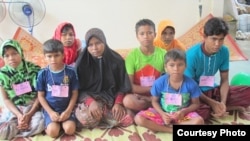A top human rights group is warning that Burma is in danger of creating a long-term state of religious segregation if it does not take steps to resettle minority Rohingya Muslim refugees.
About 100,000 Rohingya were displaced following a deadly outbreak of Muslim-Buddhist violence last year in western Rakhine state. Months later, the refugees remain in poorly supplied camps, cut off from the rest of the population and prevented from leaving by government security forces.
In a report Wednesday, Human Rights Watch says the government's failure to make efforts to return displaced Rohingya "heightens concerns of a long-term intent to segregate the population." In the city of Sittwe, the capital of Rakhine state, it says the Muslim population is now "completely segregated."
Burmese officials have suggested the segregation is temporary and necessary to prevent further unrest in an area where prejudice against Muslims is not uncommon. But Human Rights Watch says Burma has not put forward adequate plans to reconcile the communities or reintegrate the refugees.
The New York-based group is urging the government to act quickly, warning the upcoming rainy season could create a humanitarian "disaster" for the camps, many of which are in paddy fields or lowland areas. It is concerned that flooding could overflow already inadequate latrines, spreading waterborne disease through the camps.
Human Rights Watch also says tens of thousands of Rohingya, particularly those unregistered refugees living outside the camps, still lack adequate humanitarian aid. It says the Burmese government is blocking attempts by aid agencies to deliver help.
The United Nations says the Rohingya people are among the world's most persecuted minority groups. They are denied citizenship and many other basic rights in Burma, where they are instead regarded as illegal immigrants from neighboring Bangladesh.
Several rights groups say that when the unrest broke out last year in Rakhine state, Burmese security officials did little to stop, and in some cases participated in, the anti-Muslim violence.
Some say that scenario was repeated last week, when the religious tension once again surfaced in the central town of Meikhtila and proceeded to spread southward toward Rangoon. At least 40 people have been killed and thousands more displaced in the latest unrest.
About 100,000 Rohingya were displaced following a deadly outbreak of Muslim-Buddhist violence last year in western Rakhine state. Months later, the refugees remain in poorly supplied camps, cut off from the rest of the population and prevented from leaving by government security forces.
In a report Wednesday, Human Rights Watch says the government's failure to make efforts to return displaced Rohingya "heightens concerns of a long-term intent to segregate the population." In the city of Sittwe, the capital of Rakhine state, it says the Muslim population is now "completely segregated."
Burmese officials have suggested the segregation is temporary and necessary to prevent further unrest in an area where prejudice against Muslims is not uncommon. But Human Rights Watch says Burma has not put forward adequate plans to reconcile the communities or reintegrate the refugees.
The New York-based group is urging the government to act quickly, warning the upcoming rainy season could create a humanitarian "disaster" for the camps, many of which are in paddy fields or lowland areas. It is concerned that flooding could overflow already inadequate latrines, spreading waterborne disease through the camps.
Human Rights Watch also says tens of thousands of Rohingya, particularly those unregistered refugees living outside the camps, still lack adequate humanitarian aid. It says the Burmese government is blocking attempts by aid agencies to deliver help.
The United Nations says the Rohingya people are among the world's most persecuted minority groups. They are denied citizenship and many other basic rights in Burma, where they are instead regarded as illegal immigrants from neighboring Bangladesh.
Several rights groups say that when the unrest broke out last year in Rakhine state, Burmese security officials did little to stop, and in some cases participated in, the anti-Muslim violence.
Some say that scenario was repeated last week, when the religious tension once again surfaced in the central town of Meikhtila and proceeded to spread southward toward Rangoon. At least 40 people have been killed and thousands more displaced in the latest unrest.









